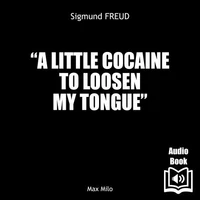In the 1880s, Freud discovered cocaine and became enthusiastic about what was not yet considered a party drug. Favoring the use of cocaine in the treatment of neurasthenia, as an energizer, or as an anesthetic, Freud made a creative and fashionable use of it, heralding practices that our society knows well. Several surprising texts are gathered here on cocaine. Freud recounts the use of coca in history, particularly in South America, from where it was imported.
In Cocaine Addiction and Cocaine Phobia, the inventor of psychoanalysis defended coca against its accusers as a dangerous product. Finally, in the letters to Martha Bernays, his future wife, we discover an intimate and loving Freud, telling how he escaped boring dinners thanks to his dear magic substance.
Sigmund Freud, whose influence is undeniable, needs no introduction. But it is here a less usual face of the psychoanalyst that the general public is invited to discover.
To quote Freud himself, there is nothing like a little cocaine to "loosen the tongue": "Such have been my performances (or rather those of cocaine) and I am very satisfied with them." A work that allows us to glimpse the importance of cocaine on the genesis of the theory of the unconscious.
In the 1880s, Freud discovered cocaine and became enthusiastic about what was not yet considered a party drug. Favoring the use of cocaine in the treatment of neurasthenia, as an energizer, or as an anesthetic, Freud made a creative and fashionable use of it, heralding practices that our society knows well. Several surprising texts are gathered here on cocaine. Freud recounts the use of coca in history, particularly in South America, from where it was imported.
In Cocaine Addiction and Cocaine Phobia, the inventor of psychoanalysis defended coca against its accusers as a dangerous product. Finally, in the letters to Martha Bernays, his future wife, we discover an intimate and loving Freud, telling how he escaped boring dinners thanks to his dear magic substance.
Sigmund Freud, whose influence is undeniable, needs no introduction. But it is here a less usual face of the psychoanalyst that the general public is invited to discover.
To quote Freud himself, there is nothing like a little cocaine to "loosen the tongue": "Such have been my performances (or rather those of cocaine) and I am very satisfied with them." A work that allows us to glimpse the importance of cocaine on the genesis of the theory of the unconscious.

 , qui est-ce ?
, qui est-ce ?